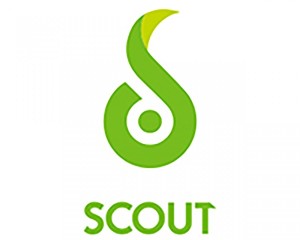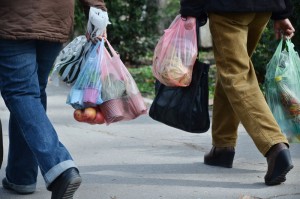Annapolis, Md. — Imagine buying a new pair of jeans at Sears, tucking them under an arm and walking out. No bag. Now, envision the same scenario with a gallon of milk and a loaf of bread. Seem weird? Retailers and consumers are being challenged by state laws to quit their paper and plastic bag habits and find new ways to carry purchases home.
We Americans have gotten attached to our single use carryout plastic and paper bags. We’ve also grown up with those horrifying signs warning: “Shoplifters will be prosecuted.” So walking out of a store without our purchases safely swaddled in big logo-bearing shopping bags feels uncomfortable. Tucking goods into our totes or handbags is awkward, to say the least.
Time to Break old Habits, Create new Norms
But it’s time to put these dated habits and phobias away and create a new norm because plastic and paper bag waste is a huge problem with harmful impacts to our oceans, rivers, lakes, forests and the wildlife that inhabit them. And that is just the beginning of it. The Washington Post has an excellent article on the topic of plastic and paper bag use. Read it at: “More Than Meets the Eye: Paper or Plastic?”
When designing the Scout Cart, we envisioned shoppers trading plastic and paper bag usage for basket use. (Just as we anticipated the Scout Cart would help urban shoppers comfortably walk to the store and back home again with everything they needed and not just what they could carry.)
California, Hawaii, others ban Single-use bags
Many consumers have already quit their single-use bag habit and are backing state legislation that prohibits use of bags by all merchants. California and Hawaii have enacted state laws against single use paper and plastic carryout bags, while other states like New York are hotly debating the issue.
Grocers and retailers seem to be ahead of the game. They are actively looking for new ways to send shoppers home with their purchases, such as inexpensive foldable plastic crates, wire baskets, and washable totes that customers can purchase at checkout and bring each time they shop. Technology that allows customers to scan purchases in the store aisle and then pack in baskets or totes — such as Scan, Bag Go by Kroger — is helping customers transition to crates, baskets and totes and away from disposable bags.
Saying no to plastic bags has reportedly paid off for California residents who have seen a 72% drop in bag litter on the state’s beaches and in its streams and waterways since 2015.
Hoping for similar results, Massachusetts’ single-use bag ban will go into effect in August. It adds farmers market vendors to the list of merchants prohibited from using plastic bags. Rhode Island is upping the ante with proposed regulation that would prohibit retailers from making available plastic checkout bags, plastic water bottles or expanded polystyrene disposable food containers at the point of sale. For more on current state legislation check out the Environmental Literacy Council.
 Next time you want to challenge yourself with breaking an old habit, consider the environment and bring your tote or basket when you shop.
Next time you want to challenge yourself with breaking an old habit, consider the environment and bring your tote or basket when you shop.
Scout Cart is a personal folding shopping cart designed to expand the distance shoppers can go on foot for the things they want and need. Our mission is to support active transportation, walkable communities, and a healthful environment.



